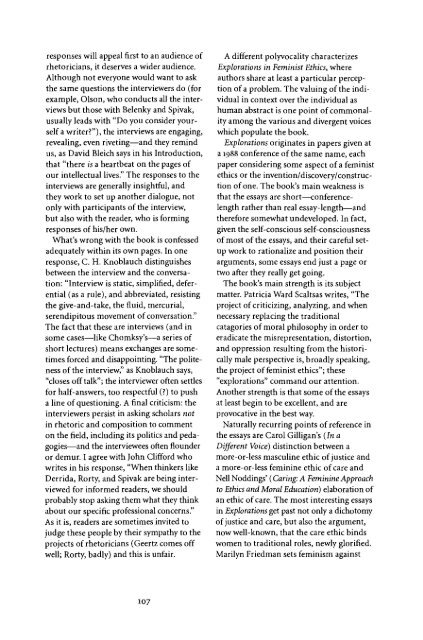To All Appearances A Lady - University of British Columbia
To All Appearances A Lady - University of British Columbia
To All Appearances A Lady - University of British Columbia
Create successful ePaper yourself
Turn your PDF publications into a flip-book with our unique Google optimized e-Paper software.
esponses will appeal first to an audience <strong>of</strong><br />
rhetoricians, it deserves a wider audience.<br />
Although not everyone would want to ask<br />
the same questions the interviewers do (for<br />
example, Olson, who conducts all the interviews<br />
but those with Belenky and Spivak,<br />
usually leads with "Do you consider yourself<br />
a writer?"), the interviews are engaging,<br />
revealing, even riveting—and they remind<br />
us, as David Bleich says in his Introduction,<br />
that "there is a heartbeat on the pages <strong>of</strong><br />
our intellectual lives." The responses to the<br />
interviews are generally insightful, and<br />
they work to set up another dialogue, not<br />
only with participants <strong>of</strong> the interview,<br />
but also with the reader, who is forming<br />
responses <strong>of</strong> his/her own.<br />
What's wrong with the book is confessed<br />
adequately within its own pages. In one<br />
response, C. H. Knoblauch distinguishes<br />
between the interview and the conversation:<br />
"Interview is static, simplified, deferential<br />
(as a rule), and abbreviated, resisting<br />
the give-and-take, the fluid, mercurial,<br />
serendipitous movement <strong>of</strong> conversation."<br />
The fact that these are interviews (and in<br />
some cases—like Chomksy's—a series <strong>of</strong><br />
short lectures) means exchanges are sometimes<br />
forced and disappointing. "The politeness<br />
<strong>of</strong> the interview," as Knoblauch says,<br />
"closes <strong>of</strong>f talk"; the interviewer <strong>of</strong>ten settles<br />
for half-answers, too respectful (?) to push<br />
a line <strong>of</strong> questioning. A final criticism: the<br />
interviewers persist in asking scholars not<br />
in rhetoric and composition to comment<br />
on the field, including its politics and pedagogies—and<br />
the interviewees <strong>of</strong>ten flounder<br />
or demur. I agree with John Clifford who<br />
writes in his response, "When thinkers like<br />
Derrida, Rorty, and Spivak are being interviewed<br />
for informed readers, we should<br />
probably stop asking them what they think<br />
about our specific pr<strong>of</strong>essional concerns."<br />
As it is, readers are sometimes invited to<br />
judge these people by their sympathy to the<br />
projects <strong>of</strong> rhetoricians (Geertz comes <strong>of</strong>f<br />
well; Rorty, badly) and this is unfair.<br />
A different polyvocality characterizes<br />
Explorations in Feminist Ethics, where<br />
authors share at least a particular perception<br />
<strong>of</strong> a problem. The valuing <strong>of</strong> the individual<br />
in context over the individual as<br />
human abstract is one point <strong>of</strong> commonality<br />
among the various and divergent voices<br />
which populate the book.<br />
Explorations originates in papers given at<br />
a 1988 conference <strong>of</strong> the same name, each<br />
paper considering some aspect <strong>of</strong> a feminist<br />
ethics or the invention/discovery/construction<br />
<strong>of</strong> one. The book's main weakness is<br />
that the essays are short—conferencelength<br />
rather than real essay-length—and<br />
therefore somewhat undeveloped. In fact,<br />
given the self-conscious self-consciousness<br />
<strong>of</strong> most <strong>of</strong> the essays, and their careful setup<br />
work to rationalize and position their<br />
arguments, some essays end just a page or<br />
two after they really get going.<br />
The book's main strength is its subject<br />
matter. Patricia Ward Scaltsas writes, "The<br />
project <strong>of</strong> criticizing, analyzing, and when<br />
necessary replacing the traditional<br />
catagories <strong>of</strong> moral philosophy in order to<br />
eradicate the misrepresentation, distortion,<br />
and oppression resulting from the historically<br />
male perspective is, broadly speaking,<br />
the project <strong>of</strong> feminist ethics"; these<br />
"explorations" command our attention.<br />
Another strength is that some <strong>of</strong> the essays<br />
at least begin to be excellent, and are<br />
provocative in the best way.<br />
Naturally recurring points <strong>of</strong> reference in<br />
the essays are Carol Gilligan's {In a<br />
Different Voice) distinction between a<br />
more-or-less masculine ethic <strong>of</strong> justice and<br />
a more-or-less feminine ethic <strong>of</strong> care and<br />
Nell Noddings' (Caring: A Feminine Approach<br />
to Ethics and Moral Education) elaboration <strong>of</strong><br />
an ethic <strong>of</strong> care. The most interesting essays<br />
in Explorations get past not only a dichotomy<br />
<strong>of</strong> justice and care, but also the argument,<br />
now well-known, that the care ethic binds<br />
women to traditional roles, newly glorified.<br />
Marilyn Friedman sets feminism against<br />
107

















